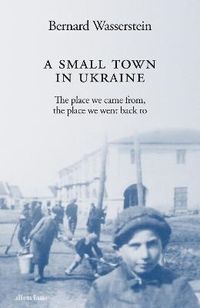
endast ny
A Small Town in Ukraine
'A fine and deeply affecting work of history and memoir' Philippe Sands
Decades ago, the historian Bernard Wasserstein set out to uncover the hidden past of the town forty miles west of Lviv where his family originated: Krakowiec (Krah-KOV-yets). In this book he recounts its dramatic and traumatic history. 'I want to observe and understand how some of the great forces that determined the shape of our times affected ordinary people.' The result is an exceptional, often moving book.
Wasserstein traces the arc of history across centuries of religious and political conflict, as armies of Cossacks, Turks, Swedes, and Muscovites rampaged through the region. In the age of enlightenment, the Polish magnate Ignacy Cetner built his palace at Krakowiec and, with his vivacious daughter, Princess Anna, created an arcadia of refinement and serenity. Under the Habsburg emperors after 1772, Krakowiec developed into a typical shtetl, with a jostling population of Poles, Ukrainians, and Jews.
In 1914, disaster struck. 'Seven years of terror and carnage' left a legacy of ferocious national antagonisms. During the Second World War the Jews were murdered in circumstances harrowingly described by Wasserstein. After the war the Poles were expelled and the town dwindled into a border outpost. Today, the storm of history once again flows through Krakowiec as hordes of refugees flee for their lives from Ukraine to Poland.
At the beginning and end of the book we encounter Wasserstein's own family, especially his grandfather Berl. In their lives and the many others Wasserstein has rediscovered, the people of Krakowiec become a prism through which we can feel the shocking immediacy of history. Original in conception and brilliantly achieved, Krakowiec is a masterpiece of recovery and insight.
Utgiven: 2023
ISBN: 9780241632703
Förlag: Penguin Books Ltd.
Format: Häftad
Språk: Engelska
Sidor: 320 st
'A fine and deeply affecting work of history and memoir' Philippe Sands
Decades ago, the historian Bernard Wasserstein set out to uncover the hidden past of the town forty miles west of Lviv where his family originated: Krakowiec (Krah-KOV-yets). In this book he recounts its dramatic and traumatic history. 'I want to observe and understand how some of the great forces that determined the shape of our times affected ordinary people.' The result is an exceptional, often moving book.
Wasserstein traces the arc of history across centuries of religious and political conflict, as armies of Cossacks, Turks, Swedes, and Muscovites rampaged through the region. In the age of enlightenment, the Polish magnate Ignacy Cetner built his palace at Krakowiec and, with his vivacious daughter, Princess Anna, created an arcadia of refinement and serenity. Under the Habsburg emperors after 1772, Krakowiec developed into a typical shtetl, with a jostling population of Poles, Ukrainians, and Jews.
In 1914, disaster struck. 'Seven years of terror and carnage' left a legacy of ferocious national antagonisms. During the Second World War the Jews were murdered in circumstances harrowingly described by Wasserstein. After the war the Poles were expelled and the town dwindled into a border outpost. Today, the storm of history once again flows through Krakowiec as hordes of refugees flee for their lives from Ukraine to Poland.
At the beginning and end of the book we encounter Wasserstein's own family, especially his grandfather Berl. In their lives and the many others Wasserstein has rediscovered, the people of Krakowiec become a prism through which we can feel the shocking immediacy of history. Original in conception and brilliantly achieved, Krakowiec is a masterpiece of recovery and insight.
Ny bok
193 kr203 kr
5% studentrabatt med Studentapan
Begagnad bok (0 st)
Varje vecka tillkommer tusentals nya säljare. Bevaka boken så får du meddelande när den finns tillgänglig igen.



